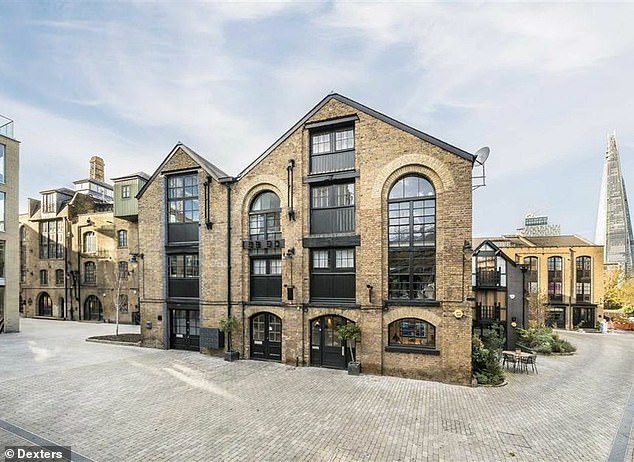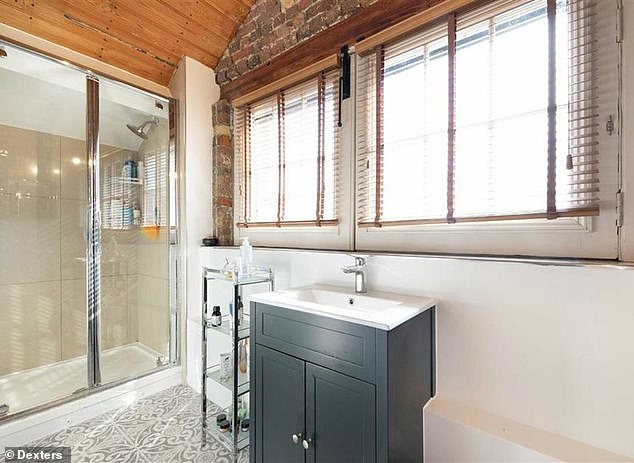EXCLUSIVESurge in shops and offices converted to homes as landlords tap in to sky-high property demand
- Requests to change use of properties jumped 63% between 2021 and 2023
The number of applications made to councils to change the use of a property from commercial to residential has soared in recent years, according to new figures.
Such requests, which enable buildings such as offices, shops and warehouses to be converted to homes, soared by 63 per cent between 2021 and 2023 according to data from Direct Line Landlord Insurance seen by This is Money.
It said the change was due to landlords and developers looking to take advantage of soaring housing demand.
The number of applications that were approved grew by 60 per cent during the same period.
According to the data, which came via a Freedom of Information request, the number of change of use applications this year is on track to exceed last year's figure by a further 20 per cent.
Changes announced by the previous Conservative Government mean that, since 1 August, unused commercial property can be converted into residential homes without full planning permission.

On sale: Dexters is selling this conversion flat in Maltings Place, London Bridge, for £800,000
This change, the research suggests, has created 'new opportunities' for landlords looking for a 'sustainable' income.
Labour has also pledged to build 1.5 million homes over its first five years in power.
Haringey in London saw a 100 per cent increase in approved commercial to residential change of use applications between 2021 to 2023.
At 90 per cent, Somerset saw the second highest percentage increase in approved change of use applications during the period.
Enfield, Merton, Croydon, Ealing Lewisham, Hackney, Wakefield and Bristol also made it to the top 10 list of locations with the highest increase in approved change of use applications in the period. Seven London boroughs featured in the top ten.
Sheffield and Milton Keynes saw a 58 per cent and 57 per cent increase in approved change of use applications respectively, as offices, shops and warehouses were repurposed to meet growing residential demand.
Jonny McHugh, head of landlord at Direct Line, told This is Money: 'The property market is constantly evolving and as demand for residential property continues to soar, it has increased the attractiveness of converting commercial units for domestic use.
'By converting underused commercial properties into residential units, landlords can help maintain their revenue streams and future proof their investments.'
Jeremy Leaf, a north London estate agent and former Rics residential chairman, said: 'One of the reasons we've seen an increase in commercial to residential conversions is probably the acute shortage of stock, especially in areas of highest demand.
'Planning permission could be more straightforward and quicker for these properties than conversion of residential or even new build, bearing in mind commercial fulfils the "brownfield" definition and should include existing infrastructure and services.'
But he cautioned that these projects may not be as simple as they first seem, especially for ambitious home buyers without a property background.

Could be yours: The property at London Bridge is a split level warehouse conversion

Spacious: The flat in London has two bedrooms, two bathrooms and a balcony

Features: Flats in The Maltings Place block are brimming with features showing the site's history
'Conversions are not always routine internally, depending on existing layouts and the location of things like utilities and partitions,' he said.
'Outside space too, other than on the ground floor, could present a significant challenge although many can include some wonderful "distressed chic" or "loft style" apartments which are often particularly attractive and valuable.'
While the trend for converting business and shop premises into residential homes has risen sharply in the last few years, there is no guarantee this will continue apace.
Landlords face higher stamp duty fees and increased regulation, and the cost of getting building and renovation work done is also high.
Buying commercial property and converting it into people's homes isn't for the faint-hearted, but it can be lucrative.
Specialist finance is likely to be required and buyers and prospective landlords need to be aware of local regulations for commercial to residential conversions.
Detailed site plans and drawings would need to be submitted to the local authority. Fire safety and minimum space requirements would also need to be factored into any plans.




























































